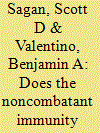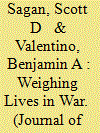| Srl | Item |
| 1 |
ID:
121096


|
|
|
|
|
| Publication |
2013.
|
| Summary/Abstract |
How strong are normative prohibitions on state behavior? We examine this question by analyzing anti-nuclear norms, sometimes called the "nuclear taboo," using an original survey experiment to evaluate American attitudes regarding nuclear use. We find that the public has only a weak aversion to using nuclear weapons and that this aversion has few characteristics of an "unthinkable" behavior or taboo. Instead, public attitudes about whether to use nuclear weapons are driven largely by consequentialist considerations of military utility. Americans' willingness to use nuclear weapons increases dramatically when nuclear weapons provide advantages over conventional weapons in destroying critical targets. Americans who oppose the use of nuclear weapons seem to do so primarily for fear of setting a negative precedent that could lead to the use of nuclear weapons by other states against the United States or its allies in the future.
|
|
|
|
|
|
|
|
|
|
|
|
|
|
|
|
| 2 |
ID:
175081


|
|
|
| 3 |
ID:
153631


|
|
|
|
|
| Summary/Abstract |
Numerous polls demonstrate that U.S. public approval of President Harry Truman's decision to drop the atomic bombs on Hiroshima and Nagasaki has declined significantly since 1945. Many scholars and political figures argue that this decline constitutes compelling evidence of the emergence of a “nuclear taboo” or that the principle of noncombatant immunity has become a deeply held norm. An original survey experiment, recreating the situation that the United States faced in 1945 using a hypothetical U.S. war with Iran today, provides little support for the nuclear taboo thesis. In addition, it suggests that the U.S. public's support for the principle of noncombatant immunity is shallow and easily overcome by the pressures of war. When considering the use of nuclear weapons, the majority of Americans prioritize protecting U.S. troops and achieving American war aims, even when doing so would result in the deliberate killing of millions of foreign noncombatants. A number of individual-level traits—Republican Party identification, older age, and approval of the death penalty for convicted murderers—significantly increase support for using nuclear weapons against Iran. Women are no less willing (and, in some scenarios, more willing) than men to support nuclear weapons use. These findings highlight the limited extent to which the U.S. public has accepted the principles of just war doctrine and suggest that public opinion is unlikely to be a serious constraint on any president contemplating the use of nuclear weapons in the crucible of war.
|
|
|
|
|
|
|
|
|
|
|
|
|
|
|
|
| 4 |
ID:
107597


|
|
|
|
|
| Publication |
2011.
|
| Summary/Abstract |
InIntervening militarily to save lives abroad often sounds good on paper, but the record has not been promising. The ethical calculus involved is almost always complicated by messy realities on the ground, and the opportunity costs of such missions are massive. Well-meaning countries could save far more lives by helping refugees and victims of natural disasters and funding public health.
|
|
|
|
|
|
|
|
|
|
|
|
|
|
|
|
| 5 |
ID:
171798


|
|
|
|
|
| Summary/Abstract |
This article explores how the American public weighs tradeoffs between foreign and compatriot fatalities during war. This focus provides an important window into the meaning and significance of citizenship and national identity and, in turn, the most fateful consequences of inclusion and exclusion in the international context. To examine these attitudes, we conducted an original survey experiment asking subjects to consider a fictional US military operation in Afghanistan. We find that: (1) Americans are significantly more willing to accept the collateral deaths of foreign civilians as compared to American civilians in operations aiming to destroy important military targets; (2) Americans are less willing to risk the lives of American soldiers to minimize collateral harm to foreign civilians as compared to American civilians; (3) Americans who express relatively more favorable views of the United States compared to other nations are more willing to accept foreign collateral deaths in US military operations; and (4) Americans are more willing to accept Afghan civilian collateral deaths than those of citizens from a neutral state, such as India. Many Americans recognize that placing a much higher value on compatriot lives over foreign lives is morally problematic, but choose to do so anyway.
|
|
|
|
|
|
|
|
|
|
|
|
|
|
|
|